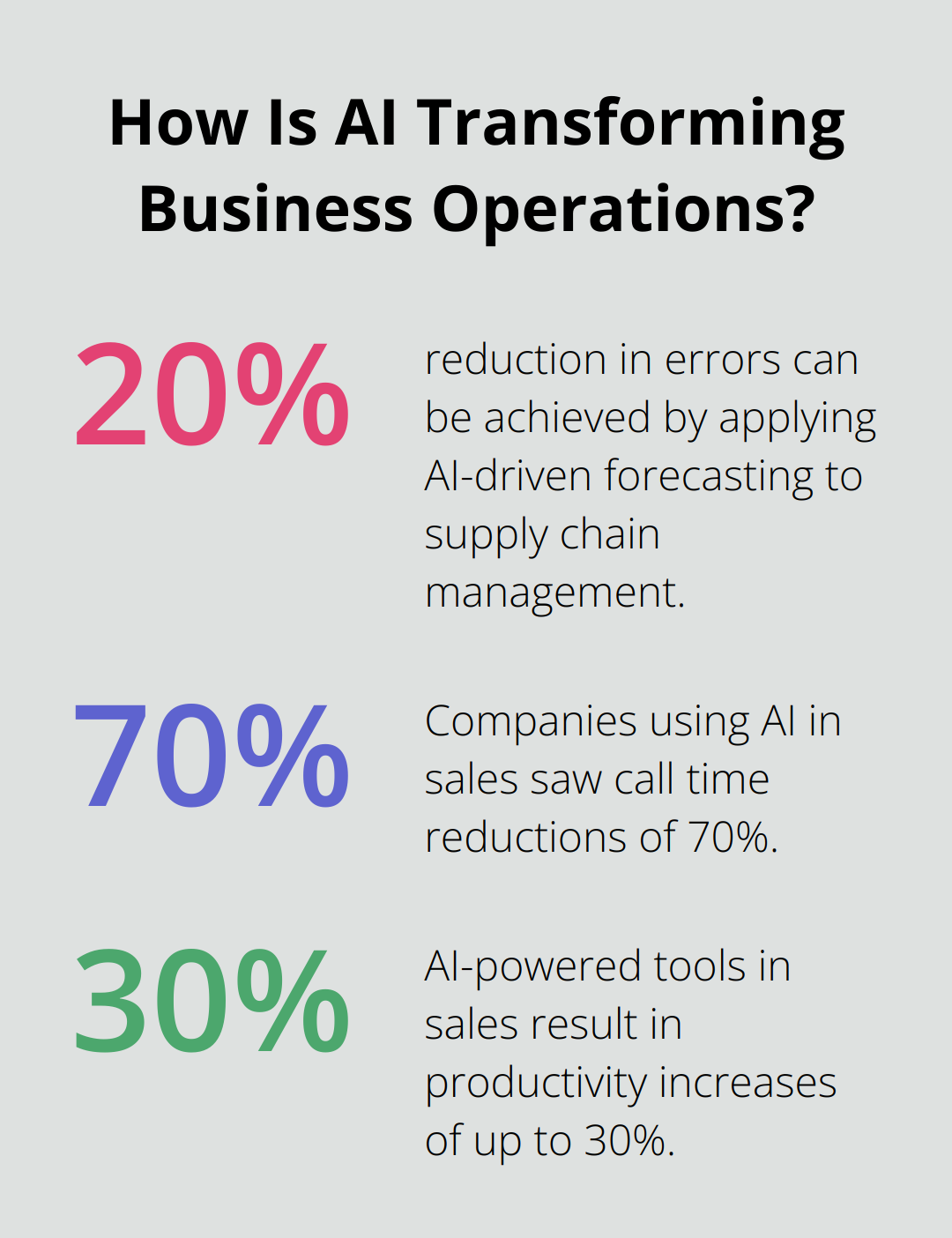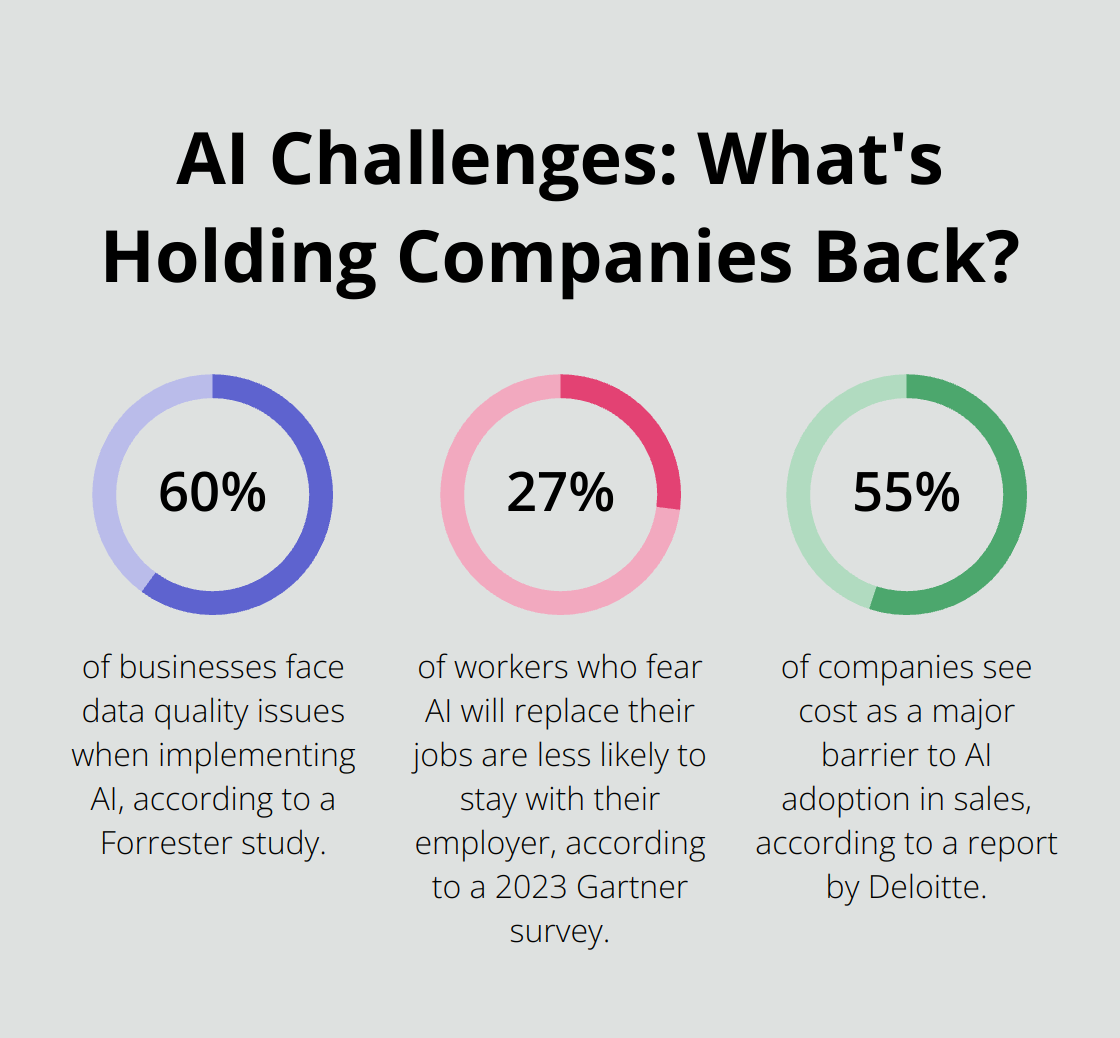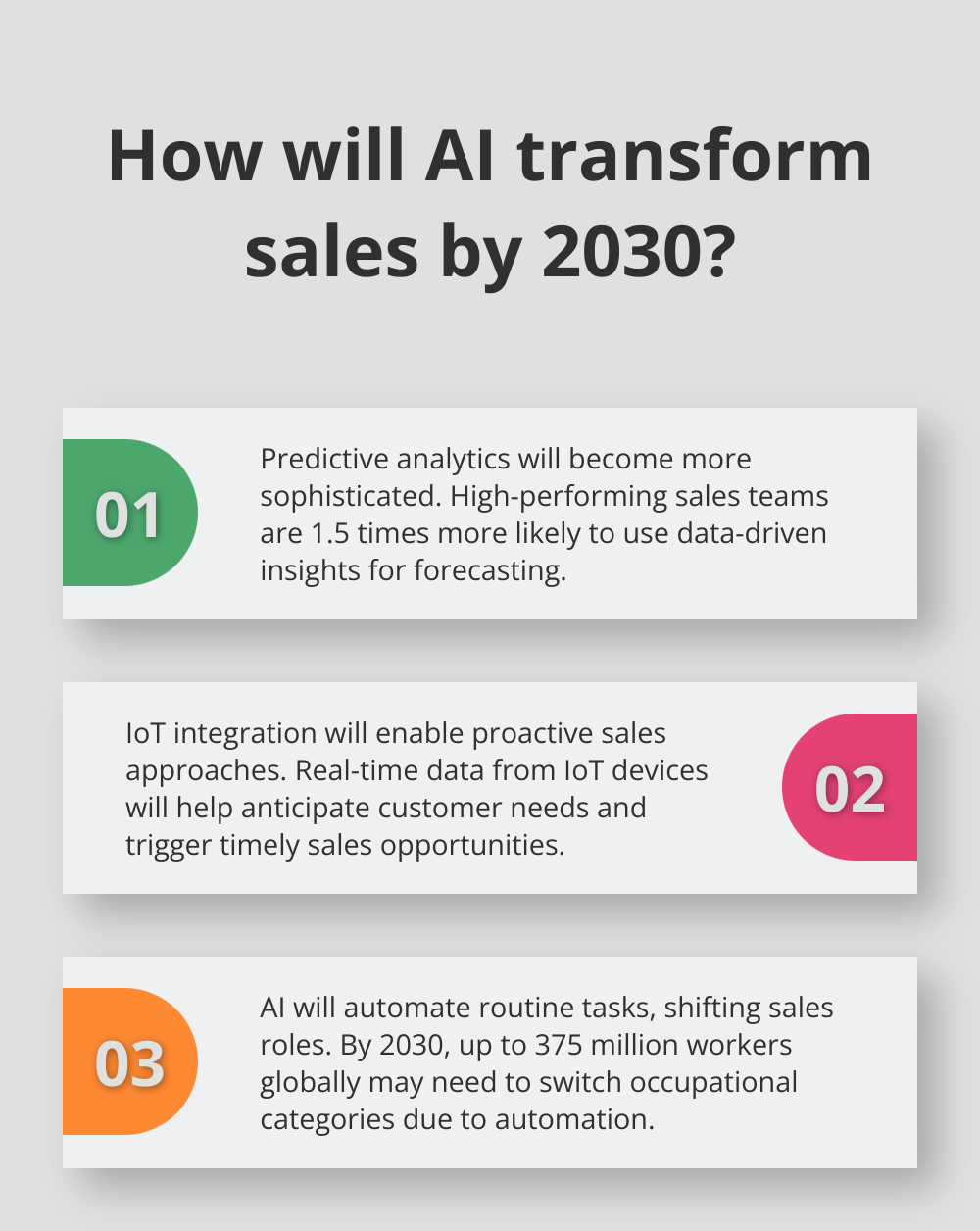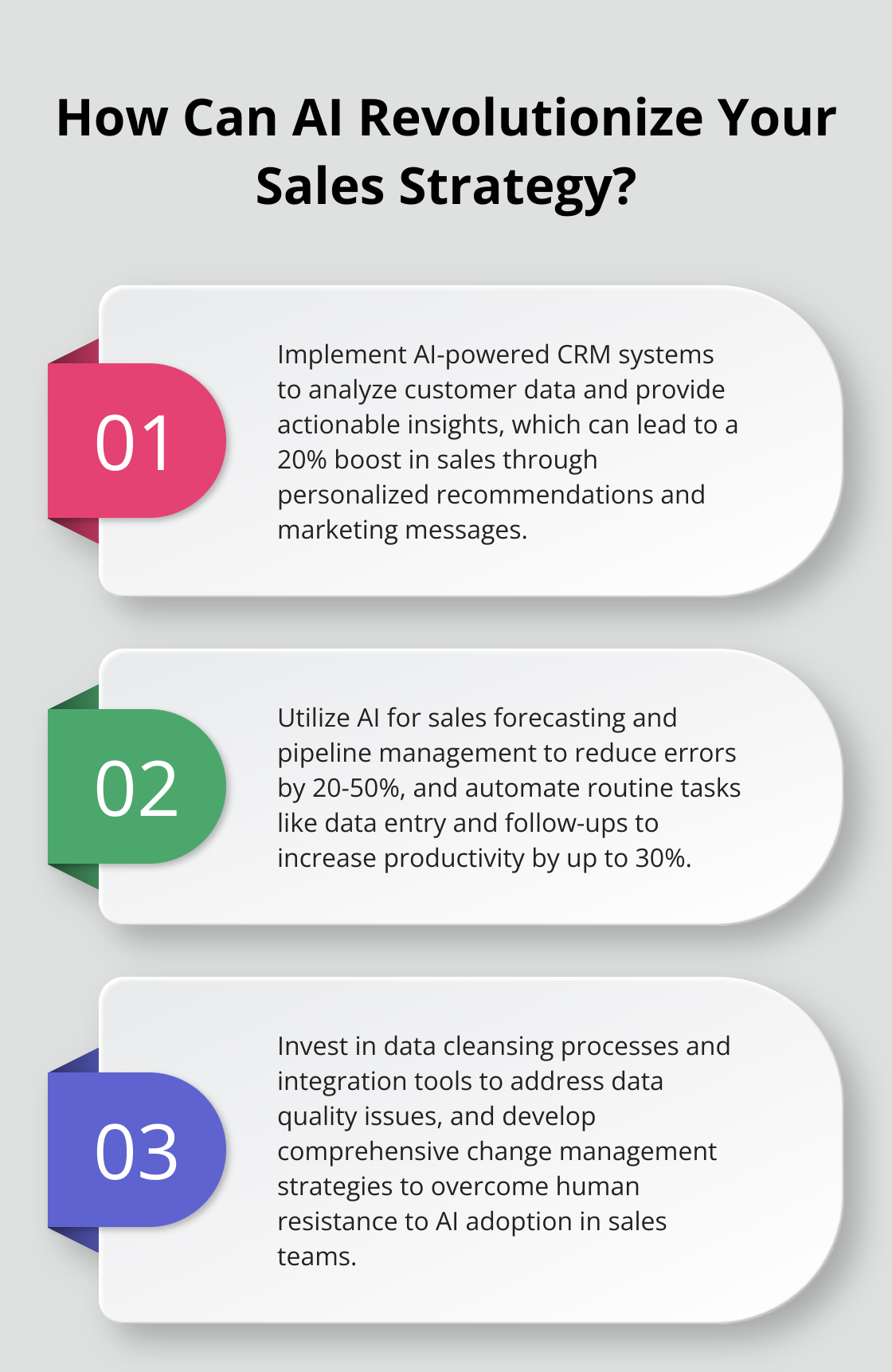At Help Reply, we’re excited to explore the transformative potential of AI in sales.
This blog post delves into the current state of AI in sales, laying the foundations for future research. We’ll examine the challenges and limitations faced by organizations implementing AI in their sales processes.
Finally, we’ll outline promising directions for future research, aiming to push the boundaries of AI’s capabilities in sales.
How Is AI Reshaping Sales Today?
AI-Powered Sales Tools in Action
AI revolutionizes the sales landscape, offering unprecedented opportunities for businesses to streamline processes, enhance customer interactions, and boost overall performance. Technologies like natural language processing, machine learning, and predictive analytics lead this transformation.

Sales teams increasingly leverage AI-powered customer relationship management (CRM) systems. These advanced platforms analyze vast amounts of customer data to provide actionable insights. Leading CRM platforms like HubSpot, Salesforce, Microsoft Dynamics, Adobe/Marketo, and Zoho offer AI capabilities to enhance sales processes.
Conversational AI also changes the game. Chatbots and virtual assistants handle initial customer inquiries, qualify leads, and even schedule appointments. This automation allows sales professionals to focus on high-value activities that require a human touch.
Enhancing Sales Processes with AI
AI makes significant strides in sales forecasting and pipeline management. AI algorithms predict future sales with remarkable accuracy by analyzing historical data and market trends. A study by McKinsey found that applying AI-driven forecasting to supply chain management can reduce errors by between 20 and 50 percent.
Personalization is another area where AI excels. AI tailors product recommendations and marketing messages by analyzing customer behavior and preferences. This level of personalization leads to increased conversion rates, with some businesses reporting up to a 20% boost in sales.
Measuring AI’s Impact on Sales Performance
The impact of AI on sales performance is substantial. A report by Harvard Business Review found that companies using AI in sales saw an increase in leads and appointments by over 50%. Moreover, these businesses experienced cost reductions of 40-60% and call time reductions of 60-70%.
Efficiency gains are equally impressive. AI-powered tools automate routine tasks like data entry and follow-ups, allowing sales teams to spend more time on strategic activities. This shift results in productivity increases of up to 30% (according to a study by Accenture).
The Human-AI Synergy in Sales
While AI transforms sales, human expertise remains invaluable. The most successful organizations strike a balance between AI capabilities and human skills. AI augments human abilities, enabling sales professionals to make more informed decisions and focus on relationship-building aspects of sales.
For instance, AI can analyze customer sentiment during calls, providing real-time feedback to sales representatives. This synergy between AI and human intuition creates a powerful combination that drives sales performance to new heights.
The Future of AI in Sales
As AI continues to evolve, we expect to see even more innovative applications in the sales field. From predictive lead scoring to AI-powered sales coaching, the possibilities are vast. Companies that embrace these technologies (while maintaining a human-centric approach) will likely gain a significant competitive advantage in the coming years.
The next chapter will explore the challenges and limitations that organizations face when implementing AI in their sales processes, providing a balanced view of this technological revolution.
Overcoming AI Hurdles in Sales
Data Quality: The Foundation of AI Success
The effectiveness of AI in sales depends on data quality. Poor data results in inaccurate predictions and misguided strategies. A Forrester study found that 60% of businesses face data quality issues when implementing AI.

Companies must invest in data cleansing and integration processes to address this challenge. Regular data audits, standardized data entry procedures, and advanced data integration tools prove essential. Some CRM platforms include built-in data cleansing features to ensure high-quality inputs.
Ethical Considerations in AI-Driven Sales
AI-driven sales raises significant ethical concerns, particularly around privacy and data usage. The General Data Protection Regulation (GDPR) in Europe and similar laws worldwide have highlighted these issues.
Companies must prioritize transparency in their AI usage. They should communicate clearly to customers how their data is used and provide opt-out options. Educating AI developers and stakeholders about ethical considerations and best practices is essential for fostering responsible AI development.
Overcoming Human Resistance to AI Adoption
Human resistance to AI adoption presents a significant challenge. A 2023 Gartner survey found that workers who fear AI will replace their jobs are 27% less likely to stay with their employer.
Organizations need comprehensive change management strategies to combat this resistance. This includes clear communication about AI’s role in augmenting (not replacing) human skills. Training programs prove essential – some tech companies offer AI readiness courses for sales professionals.
Involving sales teams in the AI implementation process can increase buy-in. When sales reps view AI as a tool to enhance their performance rather than a threat, adoption rates increase.
Technical Integration Challenges
Integrating AI systems with existing sales infrastructure can present technical challenges. Legacy systems often struggle to communicate with modern AI platforms, leading to data silos and inefficiencies.
Cloud-based solutions offer a way forward. Some platforms (like Help Reply) provide seamless integration with popular tools like Gmail and Outlook, minimizing technical hurdles. Companies should consider gradual implementation, starting with pilot programs before full-scale rollouts.
Balancing Cost and ROI
The initial investment in AI can be substantial. A report by Deloitte found that 55% of companies see cost as a major barrier to AI adoption in sales.
However, the long-term ROI often justifies the investment. Companies can start small with targeted AI applications in high-impact areas of their sales process. As benefits become apparent, scaling up becomes easier to justify.
The challenges of implementing AI in sales are significant, but not insurmountable. As we move forward, it’s important to consider the future directions of AI in sales and how these might shape the industry landscape.
What’s Next for AI in Sales?
Predictive Analytics Takes Center Stage
Predictive analytics will become more sophisticated and accurate. Machine learning algorithms will be able to predict not only overall sales but also customer-specific purchasing patterns. Sales teams will use these advanced techniques to forecast sales numbers, customer behavior, market trends, and effective sales strategies for specific scenarios.

A Salesforce study found that high-performing sales teams are 1.5 times more likely to base forecasts on data-driven insights. This trend will accelerate as AI models become more refined.
AI and IoT: A Powerful Combination
The integration of AI with Internet of Things (IoT) devices opens up new possibilities for sales. IoT sensors will provide real-time data on product usage, allowing sales teams to anticipate customer needs and offer timely upgrades or complementary products.
A printer manufacturer could use IoT data to predict when a customer will run out of ink (triggering a sales opportunity). This proactive approach will boost customer satisfaction and repeat sales.
Sales Roles and Skills Redefined
AI will take over routine tasks, and the role of sales professionals will evolve. By automating routine administrative tasks, sales professionals can allocate more time and energy to strategic sales planning, training, and relationship building. The focus will shift towards interpreting AI-generated insights and creative problem-solving.
A McKinsey report suggests that by 2030, up to 375 million workers globally may need to switch occupational categories due to automation. For sales, this means a greater emphasis on skills like emotional intelligence, creative problem-solving, and data interpretation.
Sales training programs will adapt to this new reality. Companies that invest in upskilling their sales force to work alongside AI will see the greatest returns. This might include courses on data analysis, AI tool proficiency, and advanced interpersonal skills.
AI-Powered Personalization
AI will enhance personalization in sales to unprecedented levels. Machine learning algorithms will analyze vast amounts of customer data (including social media activity, purchase history, and browsing behavior) to create highly targeted sales approaches.
This hyper-personalization will extend to product recommendations, pricing strategies, and even the timing of sales outreach. The result? Increased conversion rates and customer loyalty.
Ethical AI in Sales
As AI becomes more prevalent in sales, ethical considerations will take center stage. Companies will need to address issues such as data privacy, algorithmic bias, and transparency in AI decision-making.
We will see the development of AI ethics frameworks specifically tailored for sales applications. These frameworks will guide the responsible use of AI in customer interactions, lead scoring, and sales forecasting.
AI in sales is rapidly advancing, opening up new avenues for research and exploration. As we continue to uncover the potential of AI in this field, it’s crucial to address current gaps in our understanding and prepare for the evolving landscape of sales technology.
Final Thoughts
AI in sales lays the foundations for future research and innovation in the industry. The integration of AI technologies has improved sales performance, efficiency, and customer engagement through AI-powered CRM systems, predictive analytics, and personalized marketing. Challenges such as data quality issues, ethical concerns, and resistance to change present opportunities for further development and responsible AI applications in sales.

The future of AI in sales promises advanced predictive analytics, IoT integration, and hyper-personalization. Sales professionals must adapt their roles and skills, focusing on strategic thinking, emotional intelligence, and the ability to interpret AI-generated insights. Organizations need to balance AI adoption with ethical practices and a focus on enhancing human capabilities to maintain competitiveness.
Help Reply’s AI-powered solution demonstrates how AI can enhance sales and customer support. We automate routine tasks, allowing sales teams to concentrate on high-value activities that drive business growth. As AI in sales evolves, we must continue to explore its long-term effects on sales roles, customer relationships, and business models to benefit all stakeholders.


Leave a Reply